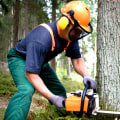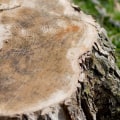Wood has been around since the 900s, and its roots can be traced back to an Old English word that initially meant “house” or “building”. This word also came to mean “building material”, wood and “trees” or “forests”. Timbers are large square lengths of wood that are used to build a house or boat. The noun wood comes from the verb wood, which means “to move awkwardly or awkwardly, for example, due to carrying something heavy (such as wooden planks).
Wood is most commonly used as a mass noun, meaning that it is a singular noun that refers to multiple things and is not pluralized. Wood can be used to refer to wood at different stages of processing. Sometimes, it refers to trees in a wooded area that will be cut down for use. Other times, it means trees that have already been cut down but have not yet been processed into planks and other forms to be built.
And other times it refers to wood after it has been processed (a more common word for this is wood). In the United States and Canada, wood is used to describe trees that have been cut down but have not yet been processed into planks or boards (called wood). In the UK and Australia, wood is the word used for any wood that will be used in construction. Wood is most commonly used in the context of forestry and logging, but its use varies by location.
In all cases, it usually refers to wood that will be used as a building material. Here in Alaska, many moose hunters frequent old stands of burnt wood, and these are full of small dead trees and debris that can damage an ATV quite easily if you are not careful. It would also reinstate the taxes on the unemployment of timber, which are based on the value of the trees being cut. In an article published in June, the three news organizations found that the largest timber companies in the state received billions of dollars in tax cuts since the 1990s.
At the same time, a surge in home renovations and do-it-yourself home projects during the pandemic, just look at the profits of Home Depot and Lowe's, and the spike in home construction has increased demand for wood. Although trade was officially banned, he explains, timber was still harvested and sold locally. With great foresight, he wields an 8-pound maul through the wood. Although the company imports its wood from a timber supplier, it is cut and processed. At the same time, a surge in home renovations and do-it-yourself home projects during the pandemic, just look at the profits of Home Depot and Lowe's, and the spike in home construction has increased demand for wood. Although trade was officially banned, he explains, timber was still harvested and sold locally. With great foresight, he wields an 8-pound maul through the wood. Although the company imports its wood from a timber supplier, it is cut and processed.
A vendor found a wooden camp in a Nichols camp, with a fresh three-rock campfire. The moment they hit the bait, the heavy blow of wood would fall on the tiger's head. I stopped and took a look, but the wood thickets were plentiful enough to cut out a clear view of the floor. The box was fixed on the motor shaft on two wooden beams from wall to wall.
It is like eating a fire smothered in rotten wood, since it is silent and unhurried. There was then a lot of old wood around the place and a long avenue of oaks, as well as three large cherry orchards. Usually, someone like a lumberjack who cuts down a tree in a forest screams WOOD when the tree is about to fall, warning anyone in a close radius not to be crushed. In the UK, timber prepared for construction is called timber (and is sold in what is known as a sawmill).
More generally, wood can refer collectively to living trees or to a wooded area, regardless of whether the trees will be harvested for timber. This is because those lumberjacks are going to use the tree to make wood, also known as wood or the wood used for construction. Wood is a word of warning similar to what binders are called in golf when they hit a ball at other people. The cutting of wood into wood is done in the wood factory (or sawmill) and you buy the boards and planks from a sawmill.
In all cases, it usually refers to wood that will be used as a building material.



